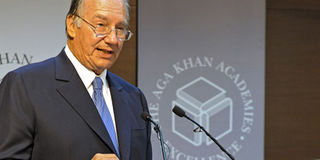Pluralism key to peace, progress, says Aga Khan

The Aga Khan addresses the audience at the inaugural ceremony of the Aga Khan Academy Hyderabad - the second in a network of 18 Academies to be built in 14 countries globally. The first academy is in Mombasa. Photo: AKDN / Gary Otte
What you need to know:
Aga Khan academies work to create an integrated global community that encompasses economic, ethnic, religious and geographic diversity.
- Students draw valuable life lessons not only from learning together but also from living together — especially if the mix is diverse.
The Aga Khan has noted the importance of pluralism in tackling increasing fragmentation and confrontation in the world. In an interview with IB Magazine, the global leader of the Shia Ismaili Muslims, and respected philanthropist, praised pluralism as the “indispensable foundation for human peace and progress”.
“The human society is essentially pluralist, and awareness of the diverse contributions of people, across times and cultures, to global civilisation is essential in engendering respect and understanding,” he said.
GLOBAL COMMUNITY
He was speaking about the decision for Aga Khan academies to take the International Baccalaureate (IB) model, which he praised for its innovative approach to learning and promotion of multi-cultural experiences.
“Mutual understanding and respect do not come naturally, they must be taught and experienced. The academies work to create an integrated global community that encompasses economic, ethnic, religious and geographic diversity. We believe students draw valuable life lessons not only from learning together but also from living together — especially if the mix is diverse,” he said.
PROFESSIONAL DEVELOPMENT
He said, however, that it is hard to find teachers trained to embrace the IB model, especially in countries where the form of learning is rote rather than enquiry-based. “We need to reframe the role of the teacher, develop students’ ownership of their learning and support teachers in using multidisciplinary methods," he said.
"This requires emphasis of appropriate recruitment and robust professional development. The academies provide education for teachers through professional development centres."




